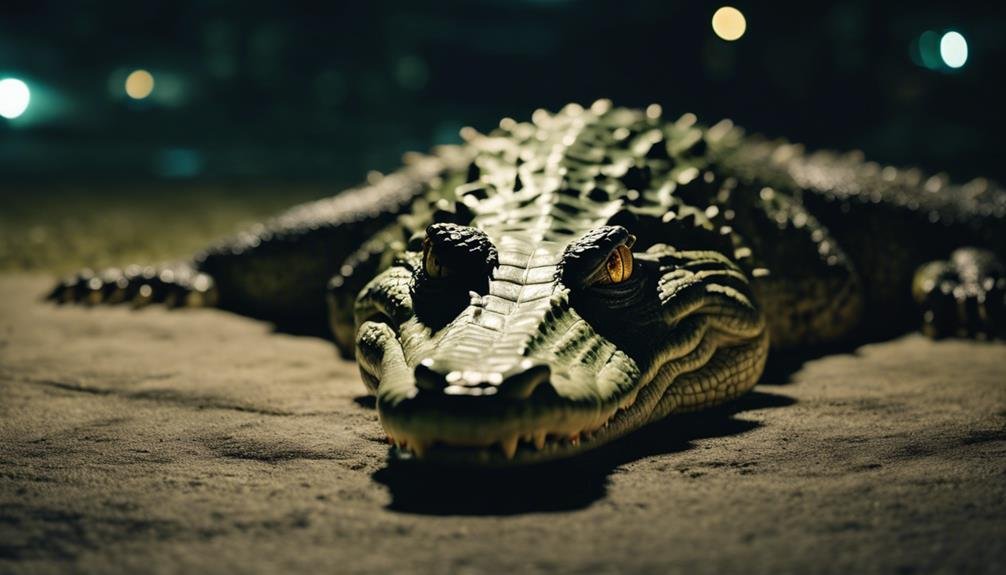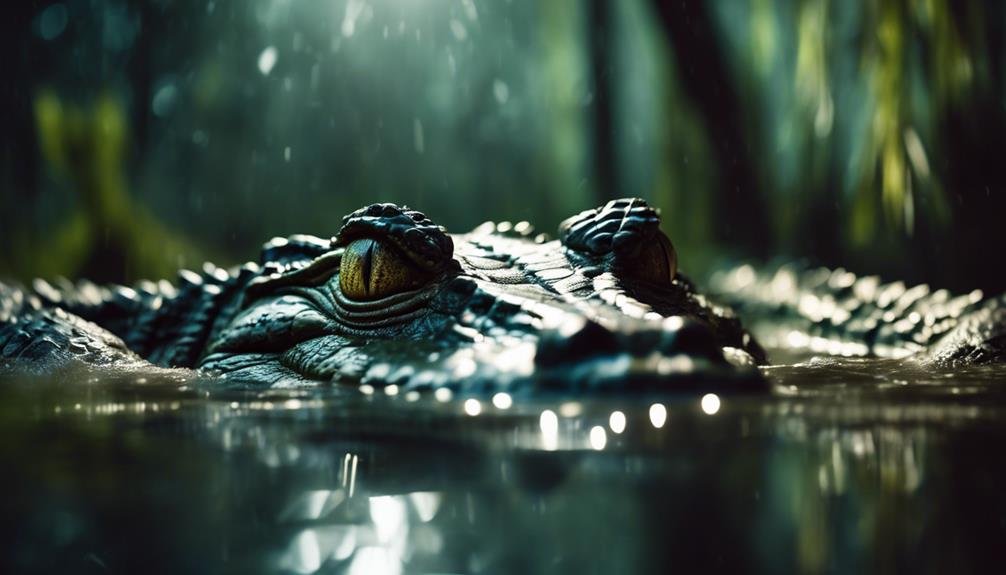Crocodiles, one of nature's most ancient creatures, possess remarkable sensory adaptations that have allowed them to thrive for millions of years. When exploring the intricacies of their physical attributes, the question often arises: do crocodiles have good eyesight? The answer lies in understanding the evolutionary marvels that have shaped their vision. Their eyes are specifically adapted to their semi-aquatic lifestyle, enabling them to hunt effectively both in water and on land. This article delves into the fascinating world of crocodile eyesight, uncovering the secrets that make them such formidable predators.
From their ability to see clearly underwater to their exceptional night vision, crocodiles have developed a keen sense of sight that complements their stealthy hunting techniques. As we explore the complexities of their vision, it becomes evident that their eyes are not only a vital tool for survival but also a testament to the wonders of natural selection. Understanding their visual capabilities provides insight into the survival strategies that have allowed crocodiles to dominate their environments for millennia.
This article aims to shed light on the question of whether crocodiles have good eyesight, providing a comprehensive overview of their visual adaptations. By examining the structure and function of their eyes, we can appreciate the intricate design that allows these creatures to thrive in diverse habitats. Through credible research and expert insights, we will uncover the truth about crocodile vision and its significance in their ecological role.
Read also:Who Is Josh Allens Twin Brother Unveiling The Truth Behind The Rumors
What Makes Crocodile Eyes Unique?
Crocodiles have eyes that are uniquely adapted to their environment, showcasing a blend of features that enhance their visual acuity. One of the most striking aspects of their eyes is their placement on the top of their heads, allowing them to see above water while remaining almost completely submerged. This adaptation is crucial for their ambush hunting style, as it enables them to remain hidden from prey while maintaining a clear line of sight.
Furthermore, crocodiles possess a specialized membrane known as the nictitating membrane, which protects their eyes while swimming. This transparent layer allows them to see clearly underwater without compromising their vision. The combination of this membrane and their ability to adjust the shape of their lenses ensures that they can focus on objects both in water and on land with remarkable precision.
Another fascinating feature of crocodile eyes is their tapetum lucidum, a reflective layer behind the retina that enhances their night vision. This adaptation allows them to see in low-light conditions, giving them an advantage during nocturnal hunting. By examining these unique features, we gain a deeper understanding of the question: do crocodiles have good eyesight?
How Does Their Vision Compare to Other Reptiles?
When comparing crocodile eyesight to that of other reptiles, it becomes evident that they possess some of the most advanced visual capabilities in the animal kingdom. Unlike many reptiles, crocodiles have binocular vision, which provides them with depth perception and enhances their ability to judge distances accurately. This feature is particularly advantageous for a predator that relies on precise timing to capture its prey.
In addition to their binocular vision, crocodiles have a high density of photoreceptor cells in their retinas, allowing them to detect even the slightest movements. This heightened sensitivity is crucial for detecting prey in their aquatic environments, where subtle movements can indicate the presence of a meal. By exploring these comparative advantages, we can better understand why crocodiles are considered apex predators in their habitats.
Do Crocodiles Have Good Eyesight in Water?
One of the most intriguing aspects of crocodile vision is their ability to see clearly underwater. Their eyes are equipped with several adaptations that enable them to maintain visual clarity in this challenging environment. The nictitating membrane, as mentioned earlier, plays a crucial role in protecting their eyes while allowing them to see underwater without distortion.
Read also:Discover The Best South Indian Movies On Skymovieshdorg South Hindi Dubbed Collection
Moreover, crocodiles can adjust the shape of their lenses to compensate for the refractive properties of water, ensuring that their vision remains sharp. This adaptation is essential for their hunting strategy, as it allows them to locate and pursue prey with precision. By answering the question of whether crocodiles have good eyesight in water, we gain insight into the evolutionary pressures that have shaped their visual system.
Why Is Vision So Important for Crocodiles?
Vision is a critical sense for crocodiles, as it directly impacts their ability to survive and thrive in their environments. Their keen eyesight enables them to detect prey from great distances, both on land and in water. This visual acuity is particularly important for a predator that relies on stealth and surprise to capture its meals.
In addition to hunting, crocodiles use their vision to navigate their surroundings and communicate with other members of their species. Their ability to see in low-light conditions allows them to remain active during the night, when many of their prey species are most vulnerable. By understanding the importance of vision for crocodiles, we can appreciate the significance of the question: do crocodiles have good eyesight?
What Role Does Light Play in Crocodile Vision?
Light plays a crucial role in crocodile vision, influencing their ability to see in different environments. The tapetum lucidum, a reflective layer behind the retina, enhances their night vision by reflecting light back through the photoreceptor cells. This adaptation allows them to see in low-light conditions, giving them an advantage over prey that relies on darkness for protection.
During the day, crocodiles rely on their ability to adjust the shape of their lenses to compensate for the refractive properties of water and air. This flexibility ensures that their vision remains sharp regardless of their surroundings. By exploring the role of light in crocodile vision, we gain a deeper understanding of their visual capabilities and how they have evolved to meet the demands of their environment.
How Does the Structure of Their Eyes Aid in Hunting?
The structure of crocodile eyes is specifically adapted to aid in hunting, providing them with the visual acuity needed to capture prey effectively. Their binocular vision allows them to judge distances accurately, ensuring that their attacks are both precise and powerful. Additionally, their high density of photoreceptor cells enables them to detect even the slightest movements, making it difficult for prey to escape unnoticed.
The placement of their eyes on the top of their heads further enhances their hunting abilities, allowing them to see above water while remaining almost completely submerged. This adaptation is crucial for their ambush hunting style, as it enables them to remain hidden from prey while maintaining a clear line of sight. By examining the structural adaptations of crocodile eyes, we can better understand how they contribute to their success as predators.
What Are the Limitations of Crocodile Eyesight?
While crocodiles possess remarkable visual capabilities, their eyesight is not without limitations. One of the primary challenges they face is the distortion caused by water, which can affect their ability to see clearly at certain depths. Although their nictitating membrane and lens adjustments help mitigate this issue, it remains a potential limitation in their underwater vision.
In addition to water-related challenges, crocodiles may experience difficulty in distinguishing colors, as their visual system is more attuned to detecting movement and contrast. This limitation is less significant for a predator that relies on motion detection to locate prey but may impact their ability to identify specific objects or individuals in their environment. By addressing the limitations of crocodile eyesight, we gain a more balanced perspective on their visual capabilities.
Do Crocodiles Have Good Eyesight on Land?
Although crocodiles are primarily associated with aquatic environments, their eyesight is equally impressive on land. Their binocular vision and high density of photoreceptor cells allow them to detect movement and judge distances accurately, making them formidable predators in terrestrial settings. This adaptability is crucial for a species that frequently transitions between water and land.
Furthermore, their ability to see in low-light conditions enables them to remain active during the night, when many of their prey species are most vulnerable. By answering the question of whether crocodiles have good eyesight on land, we highlight the versatility of their visual system and its importance in their ecological role.
How Have Evolutionary Pressures Shaped Crocodile Vision?
Evolutionary pressures have played a significant role in shaping the vision of crocodiles, driving the development of adaptations that enhance their survival in diverse environments. The need to hunt effectively both in water and on land has led to the evolution of features such as binocular vision, a high density of photoreceptor cells, and the ability to adjust lens shape. These adaptations have allowed crocodiles to thrive as apex predators for millions of years.
By examining the evolutionary pressures that have influenced crocodile vision, we gain insight into the complex interplay between genetics, environment, and natural selection. This understanding underscores the importance of the question: do crocodiles have good eyesight? and highlights the remarkable adaptations that have allowed these creatures to dominate their habitats.
Final Thoughts on Crocodile Vision
In conclusion, crocodiles possess some of the most advanced visual capabilities in the animal kingdom, showcasing the intricate adaptations that have allowed them to thrive for millions of years. Their eyes are specifically designed to meet the demands of their semi-aquatic lifestyle, enabling them to hunt effectively both in water and on land. By exploring the complexities of crocodile vision, we gain a deeper appreciation for the evolutionary marvels that have shaped these remarkable creatures.
As we continue to study the visual system of crocodiles, it becomes evident that their eyesight is a vital tool for survival, providing them with the ability to detect prey, navigate their surroundings, and communicate with other members of their species. The question of whether crocodiles have good eyesight is not only relevant to their ecological role but also highlights the wonders of natural selection and the adaptability of life on Earth.
Table of Contents
- What Makes Crocodile Eyes Unique?
- How Does Their Vision Compare to Other Reptiles?
- Do Crocodiles Have Good Eyesight in Water?
- Why Is Vision So Important for Crocodiles?
- What Role Does Light Play in Crocodile Vision?
- How Does the Structure of Their Eyes Aid in Hunting?
- What Are the Limitations of Crocodile Eyesight?
- Do Crocodiles Have Good Eyesight on Land?
- How Have Evolutionary Pressures Shaped Crocodile Vision?
- Final Thoughts on Crocodile Vision

